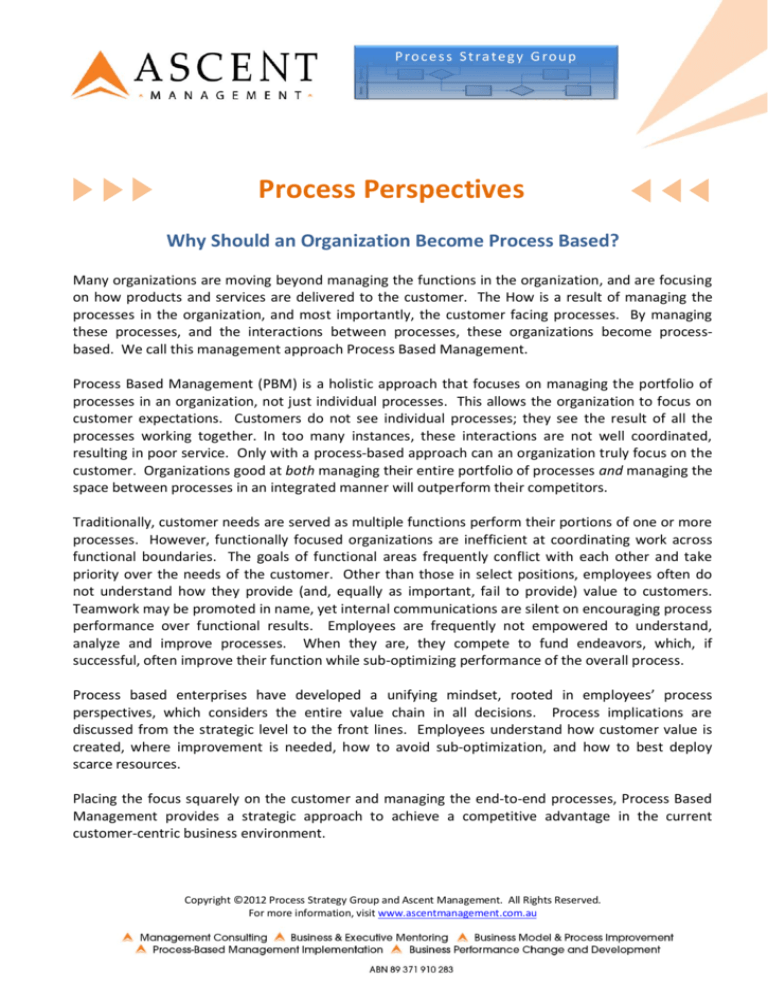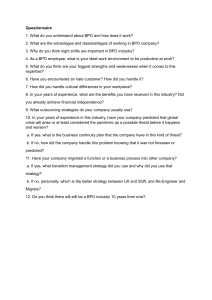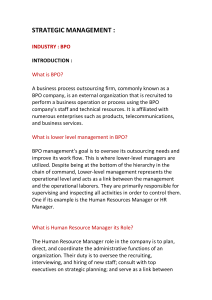
Process Perspectives
Why Should an Organization Become Process Based?
Many organizations are moving beyond managing the functions in the organization, and are focusing
on how products and services are delivered to the customer. The How is a result of managing the
processes in the organization, and most importantly, the customer facing processes. By managing
these processes, and the interactions between processes, these organizations become processbased. We call this management approach Process Based Management.
Process Based Management (PBM) is a holistic approach that focuses on managing the portfolio of
processes in an organization, not just individual processes. This allows the organization to focus on
customer expectations. Customers do not see individual processes; they see the result of all the
processes working together. In too many instances, these interactions are not well coordinated,
resulting in poor service. Only with a process-based approach can an organization truly focus on the
customer. Organizations good at both managing their entire portfolio of processes and managing the
space between processes in an integrated manner will outperform their competitors.
Traditionally, customer needs are served as multiple functions perform their portions of one or more
processes. However, functionally focused organizations are inefficient at coordinating work across
functional boundaries. The goals of functional areas frequently conflict with each other and take
priority over the needs of the customer. Other than those in select positions, employees often do
not understand how they provide (and, equally as important, fail to provide) value to customers.
Teamwork may be promoted in name, yet internal communications are silent on encouraging process
performance over functional results. Employees are frequently not empowered to understand,
analyze and improve processes. When they are, they compete to fund endeavors, which, if
successful, often improve their function while sub-optimizing performance of the overall process.
Process based enterprises have developed a unifying mindset, rooted in employees’ process
perspectives, which considers the entire value chain in all decisions. Process implications are
discussed from the strategic level to the front lines. Employees understand how customer value is
created, where improvement is needed, how to avoid sub-optimization, and how to best deploy
scarce resources.
Placing the focus squarely on the customer and managing the end-to-end processes, Process Based
Management provides a strategic approach to achieve a competitive advantage in the current
customer-centric business environment.
Copyright ©2012 Process Strategy Group and Ascent Management. All Rights Reserved.
For more information, visit www.ascentmanagement.com.au
Process Perspectives
Why Should an Organization Become Process Based?
The need for a process focus to improvement has not gone unnoticed. Popular methods such as
ABC/M, BEF, AS/NZS ISO, BPMM, Lean, Six Sigma and TQM are rooted in process thinking and tools,
and many accomplish short-term objectives.
ABC/M - Activity Based Costing and Management ABEF – Aust. Business Excellence Framework
AS/NZS ISO – Standards setting out specifications and procedures for quality and safety
BPMM – Business Process Maturity Model
TQM - Total Quality Management
However, these methods often serve as initiatives, are not linked to other methods, and are
sustained only until replaced by the next method or program. The governance and operational
frameworks of a process-based enterprise integrate diverse initiatives, methods and tools, including
the resources they require, with the organization’s strategic intent and objectives.
Process Based Management provides different, but linked, benefits to various stakeholders and
perspectives of the organization:
The key stakeholder is the customer, without whom there is no business; they should see
better service and a more targeted value proposition.
Moving inward, operations benefits from improved focus and performance. The people who
execute the processes that provide value to the customer, the employees, benefit from the
understanding, control and accountability they have as process performers.
Shareholders and debt-holders benefit from improved performance.
Suppliers benefit from the seamless and transparent interrelationship for lowering
transaction costs and improving value to the customer, and the foundation for integrated
planning and strategies across the supply chain.
Each stakeholder needs to see results; from continually improving products and services to the
bottom line impact of better managed and aligned processes.
Recent research from Dr. Kevin McCormack (Business Process Maturity: Theory and Application;
2007) has provided some quantification of the impact of being process based. In his research with
hundreds of companies on Business Process Orientation (BPO), the results show that within an
organization:
Greater levels of BPO reduced inter-functional conflict and improved interdepartmental
“connectedness”
The greater the level of BPO, the greater the organizational performance. The research
indicated that a 16.6% increase in BPO leads to a 19.4% performance improvement.
The greater the level of BPO, the greater the organizational esprit de corps.
Copyright ©2012 Process Strategy Group and Ascent Management. All Rights Reserved.
For more information, visit www.ascentmanagement.com.au












